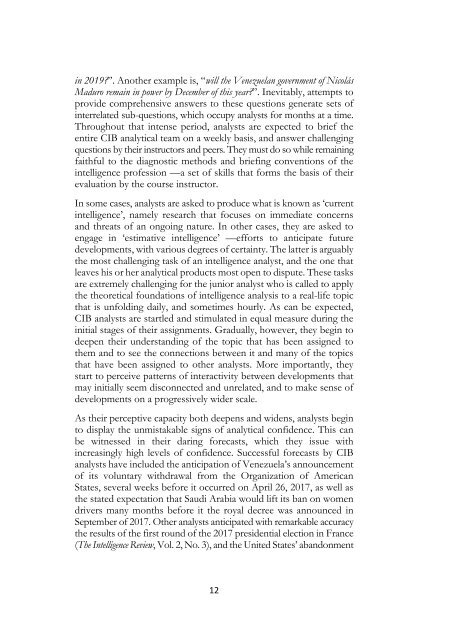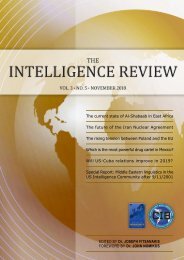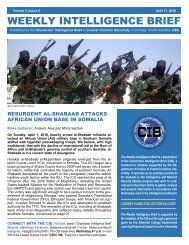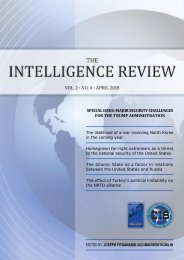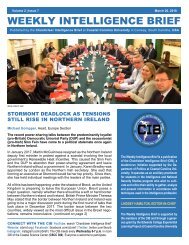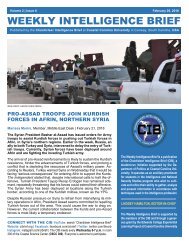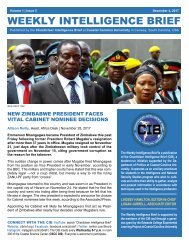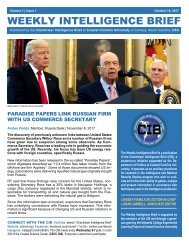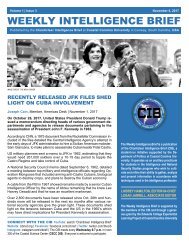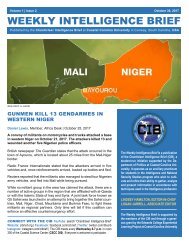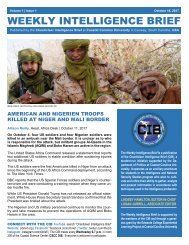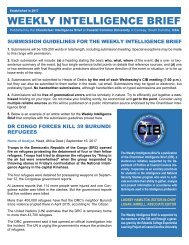The Intelligence Review | volume 3 | issue 6 |
This volume is the product of a collaboration between the European Intelligence Academy (EIA) and the Chanticleer Intelligence Brief (CIB), a pre-professional body supported by the Department of Politics at Coastal Carolina University in Conway, South Carolina, United States. Four CIB analysts tackle some of the most pressing and timely questions confronting intelligence observers today. Topics in this issue include the current and projected state of Sino-Russian relations, as well as recent and projected developments relating to the state of Russia’s Armed Forces. There is also an essay that focuses on the current and projected state of the Sinaloa cartel, one of Mexico’s most prolific organized criminal groups, whose leader, Joaquín Guzmán (also known as el Chapo), is currently serving a life sentence in an American Supermax prison. Last but not least, the present compendium includes an analysis of the leadership prospects of Israel’s embattled Prime Minister, Benjamin Netanyahu.
This volume is the product of a collaboration between the European Intelligence Academy (EIA) and the Chanticleer Intelligence Brief (CIB), a pre-professional body supported by the Department of Politics at Coastal Carolina University in Conway, South Carolina, United States. Four CIB analysts tackle some of the most pressing and timely questions confronting intelligence observers today. Topics in this issue include the current and projected state of Sino-Russian relations, as well as recent and projected developments relating to the state of Russia’s Armed Forces. There is also an essay that focuses on the current and projected state of the Sinaloa cartel, one of Mexico’s most prolific organized criminal groups, whose leader, Joaquín Guzmán (also known as el Chapo), is currently serving a life sentence in an American Supermax prison. Last but not least, the present compendium includes an analysis of the leadership prospects of Israel’s embattled Prime Minister, Benjamin Netanyahu.
You also want an ePaper? Increase the reach of your titles
YUMPU automatically turns print PDFs into web optimized ePapers that Google loves.
in 2019?”. Another example is, “will the Venezuelan government of Nicolás<br />
Maduro remain in power by December of this year?”. Inevitably, attempts to<br />
provide comprehensive answers to these questions generate sets of<br />
interrelated sub-questions, which occupy analysts for months at a time.<br />
Throughout that intense period, analysts are expected to brief the<br />
entire CIB analytical team on a weekly basis, and answer challenging<br />
questions by their instructors and peers. <strong>The</strong>y must do so while remaining<br />
faithful to the diagnostic methods and briefing conventions of the<br />
intelligence profession —a set of skills that forms the basis of their<br />
evaluation by the course instructor.<br />
In some cases, analysts are asked to produce what is known as ‘current<br />
intelligence’, namely research that focuses on immediate concerns<br />
and threats of an ongoing nature. In other cases, they are asked to<br />
engage in ‘estimative intelligence’ —efforts to anticipate future<br />
developments, with various degrees of certainty. <strong>The</strong> latter is arguably<br />
the most challenging task of an intelligence analyst, and the one that<br />
leaves his or her analytical products most open to dispute. <strong>The</strong>se tasks<br />
are extremely challenging for the junior analyst who is called to apply<br />
the theoretical foundations of intelligence analysis to a real-life topic<br />
that is unfolding daily, and sometimes hourly. As can be expected,<br />
CIB analysts are startled and stimulated in equal measure during the<br />
initial stages of their assignments. Gradually, however, they begin to<br />
deepen their understanding of the topic that has been assigned to<br />
them and to see the connections between it and many of the topics<br />
that have been assigned to other analysts. More importantly, they<br />
start to perceive patterns of interactivity between developments that<br />
may initially seem disconnected and unrelated, and to make sense of<br />
developments on a progressively wider scale.<br />
As their perceptive capacity both deepens and widens, analysts begin<br />
to display the unmistakable signs of analytical confidence. This can<br />
be witnessed in their daring forecasts, which they <strong>issue</strong> with<br />
increasingly high levels of confidence. Successful forecasts by CIB<br />
analysts have included the anticipation of Venezuela’s announcement<br />
of its voluntary withdrawal from the Organization of American<br />
States, several weeks before it occurred on April 26, 2017, as well as<br />
the stated expectation that Saudi Arabia would lift its ban on women<br />
drivers many months before it the royal decree was announced in<br />
September of 2017. Other analysts anticipated with remarkable accuracy<br />
the results of the first round of the 2017 presidential election in France<br />
(<strong>The</strong> <strong>Intelligence</strong> <strong>Review</strong>, Vol. 2, No. 3), and the United States’ abandonment<br />
12


